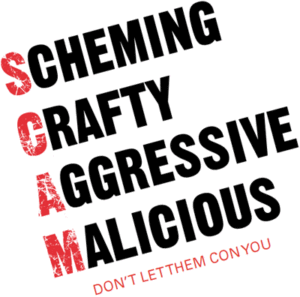
While there are legitimate charities and fundraising efforts, there are also reports of scam artists creating fake charities to con you out of your money and information.
The Federal Trade Commission has good advice on warning signs that could indicate a bogus charity.
Here is a TOP TEN List of the best tips we’ve found for detecting and avoiding scam charities.
1.) Beware pushy telemarketers: If you’re solicited for a donation, ask if the caller is a paid fundraiser, who they work for, and the percentage of your donation that will go to the charity and to the fundraiser.
2.) Ask for written information: This includes its full name, address, and telephone number.
3.) Call the charity: Find out if the organization is aware of the solicitation and has authorized the use of its name.
4.) Be wary of charities that spring up overnight:
They may make a compelling case for your money, but as a practical matter, they probably don’t have the infrastructure to get your donation to the affected area or people.
5.) Trust your gut and check your records:
Callers may try to trick you by thanking you for a pledge you didn’t make. If you don’t remember making the donation or don’t have a record of your pledge, resist the pressure to give.
6.) Be cautious of “look-alike” websites and charities: Fraudulent websites might look a lot like an authentic organization, but may have slightly different URLs. Some organizations may also use names that closely resemble well-established charities.
7.) Protect yourself: Never give your Social Security number or other personal information in response to a charitable solicitation, and don’t hand out your credit card information to an unfamiliar organization.
8.) Do your research on social network fundraising: If you’re are planning to donate through a social network solicitation, find out what percentage is going to the charity, whether you will be charged a fee, or if a percentage of your donation will be paid to the platform website.
9.) Watch out for similar sounding names:
Some phony charities use names that closely resemble those of respected, legitimate organizations. If you notice a small difference from the name of the charity you intend to deal with, call the organization you know to check it out.
10.) Be wary of charities eager to collect cash:
If they say they are sending a courier or offering overnight delivery service to collect your donation immediately, you have to wonder whether the charity is legitimate.
Two more to good things to know….
Know the difference between “tax exempt” and “tax deductible”:
Tax exempt means the organization doesn’t have to pay taxes. Tax deductible means you can deduct your contribution on your federal income tax return.
Contact the office that regulates charitable organizations and charitable solicitations in your state: The National Association of State Charity Officials has contact information for regulators in each state available on its website. Your state office also can verify how much of your donation goes to the charity, and how much goes to fundraising and management expenses.
You also can check out charities with the Better Business Bureau’s Wise Giving Alliance and GuideStar.
George J. Gingras <><
MA-IS,MCP,MCSA,MCDBA,MCSE
Senior Network Engineer
Queen City Business Networks, LLC.
859-525-9898 – Office
Using What We Know To Help Your Business Grow